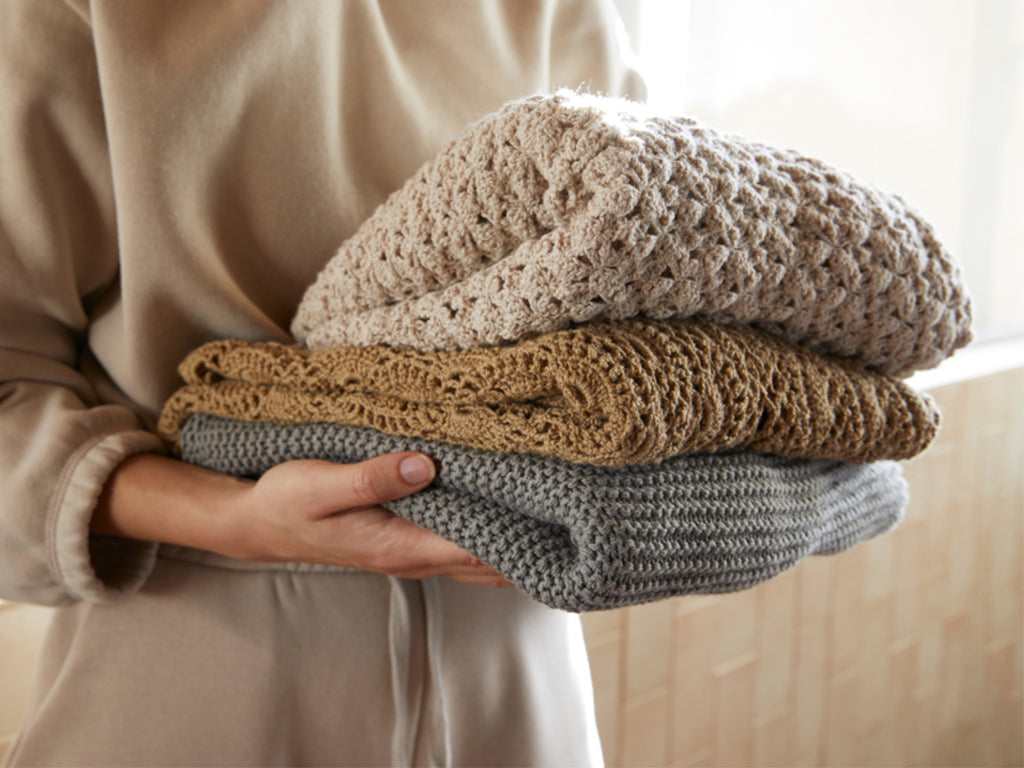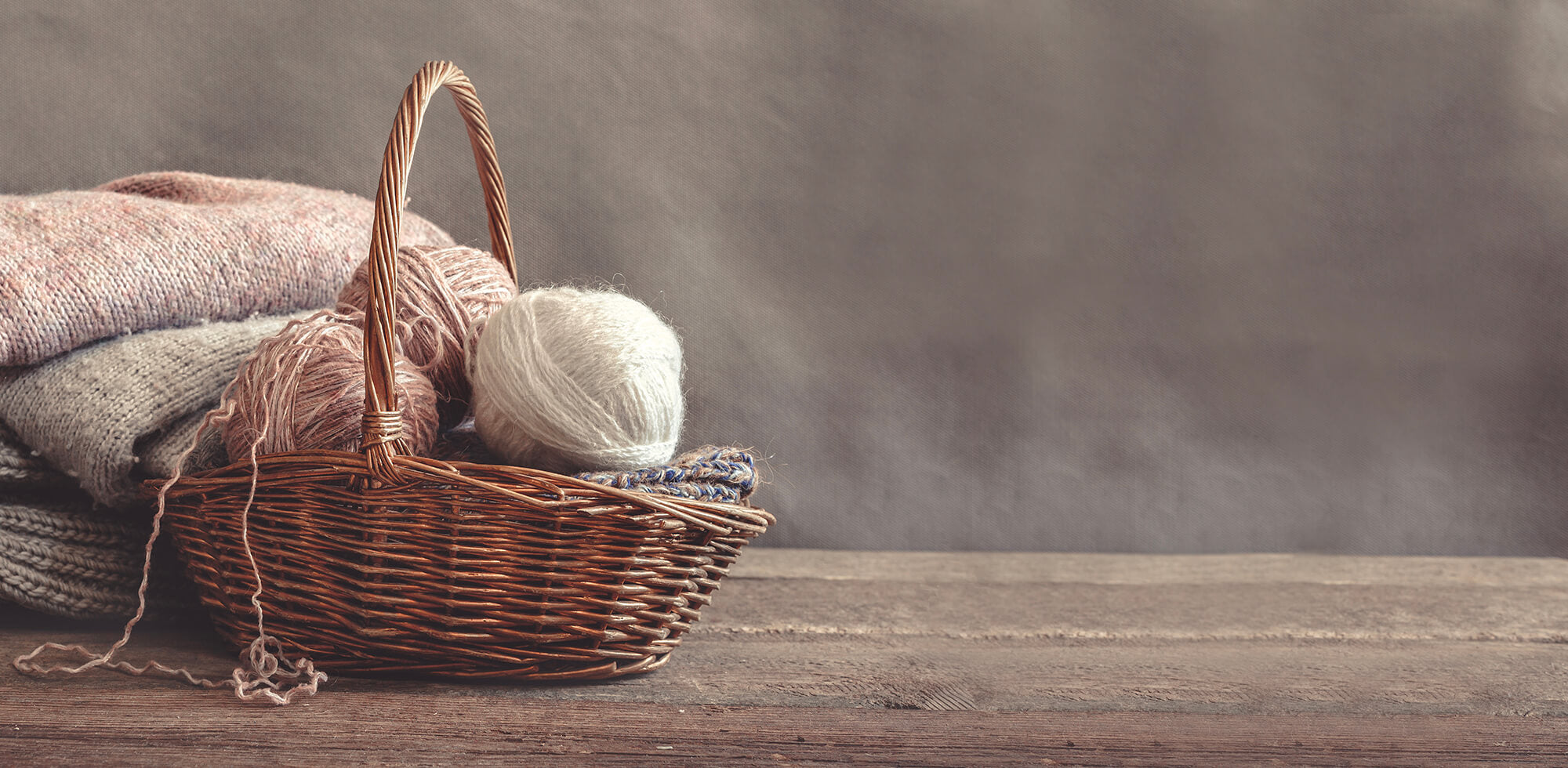By Claudia Ostrop
When we think about fashion, the first thing that often comes to mind is the finished garment – a cool hoodie, a stylish sweater, or a breezy summer dress. But few people consider where it all begins: the yarn. Often overshadowed by design, yarn tends to play a secondary role in the fashion world – even though it is actually the foundation of everything.
For us knitters and crocheters, the yarn itself naturally holds great importance – and whether it's for ready-to-wear or handcrafts: when it comes to sustainability, it is well worth taking a closer look. Especially yarn for knitting, crocheting, or embroidery should enable a thoroughly eco-friendly crafting experience. After all, while handcrafting is fun, considering how much time we invest in a knitting project, it should ultimately result in something truly wonderful. Fair wool and sustainable yarns provide a good and honest foundation for creating a great piece.
Why Yarn Is More Than Just a Thread – Sustainability in the Textile World
In industrial mass production, yarn is often manufactured as quickly and cheaply as possible – with little regard for the environment, people, or quality. Chemical processes are used, water is wasted, and production conditions are often anything but fair. As long as large volumes roll off the production line, that's all that seems to matter.
The result? Mass-produced products that are cheap but come at a high environmental and ethical cost. Sadly, this does not only apply to yarns used for ready-made garments but also to hand knitting and crocheting yarns. "Wool" made from 100% synthetic fibers. Wool from Merino sheep subjected to the painful practice of mulesing. Or yarns marketed with appealing buzzwords like "recycled" – but is the so-called recycled cashmere truly sustainable? Usually, you don't know where the scraps used to produce these yarns come from. And because they are remnants and waste materials, the resulting yarns are rarely of high quality. A sweater that pills or felts after a short time and ends up in the trash cannot be considered sustainable. This also applies to alpaca, mohair, and merino wool.

In contrast stands the production of truly sustainable yarn: focusing on quality over quantity, using natural raw materials, ensuring fair working conditions, and handling resources responsibly. Sure, such yarn may not be as cheap – but you know exactly what you are getting: a product you can craft with a clear conscience. Organic cashmere, for instance, may be significantly more expensive than the recycled variety, but considering the lifespan of a garment made from it, sustainable yarn from ethical sources is well worth it.
Fortunately, more and more people are paying closer attention when buying clothing or choosing yarns for their own projects. Origin, quality, and environmental friendliness are no longer niche topics but key purchasing arguments. Conscious consumers want to not only look good but also feel good about their choices.
In this article, we focus on yarns for handcrafts – the yarns that, through your creative work, become finished garments and accessories.
What Exactly Does “Sustainable” Mean When It Comes to Yarn?
Today, the term "sustainable" is used so frequently that it risks losing its true meaning. Whether for food, clothing, cosmetics, or lifestyle choices – sustainability has become a sought-after quality mark, including for yarns. But what does it actually entail? Is it just about feeling good, or are there real values behind it?
Let's start at the beginning: sustainable yarn starts with the raw materials. Instead of conventional cotton, which often requires huge amounts of pesticides and water, organic cotton offers a sustainable alternative that conserves both environment and resources.
Wool – whether from sheep, yak, cashmere goats, or others – depends heavily on how the animals are kept. Are the animals living in humane, species-appropriate conditions? What about animal welfare – including the issue of mulesing (you can read more about this in our blog post about wool and yarns). Nature must also be considered: for example, (cashmere) goats don't just graze but uproot plants entirely. Overgrazing in countries like China and Mongolia significantly contributes to desertification. Sustainable practices require controlled grazing and supplementary feeding – a topic we explore further in our blog post about cashmere.

Fully synthetic yarns derived from petroleum cannot be considered sustainable, as their base is non-renewable. Semi-synthetic yarns like viscose depend on how they are produced: the process can determine whether they are sustainable or not (see our blog post on viscose for more details).
And then there’s production itself. Sustainable yarn production relies on minimizing resource use: less water, lower CO₂ emissions, and reduced energy consumption. Instead of energy-intensive processes and harmful chemicals, eco-friendly alternatives like closed-loop water recycling systems are used
However, sustainability goes beyond environmental protection. True sustainability also means social responsibility: fair wages, safe workplaces, and good working conditions for everyone involved in the production chain – from farmers to factory workers.
Transparency is another crucial factor. Truly sustainable yarn producers openly disclose where their materials come from, how they are processed, and who is involved. Traceability is not just a bonus – it is the standard, ensuring you know exactly what you are holding in your hands.
In short: sustainable yarns are good for the environment, good for people, and good for all those who want to craft and consume responsibly.
Pascuali: Our Philosophy and Journey

Paul Pascuali founded the company in 2008 with a clear goal: to support small, selected farms in Argentina where animal welfare was the top priority. Fair prices were paid for the wool produced there, and local spinning mills handled processing.
Today, Pascuali’s business has grown beyond its original idea. Production also takes place in Peru, Bolivia, South Africa, Italy, Portugal, and Canada – always under strict standards of fair conditions, high quality, and sustainable processing. Close collaboration with local producers remains a core element of the company's philosophy.
Pascuali’s mission is to create "luxury yarns with responsibility" – proving that luxury and sustainability can go hand in hand. All Pascuali yarns are manufactured to the highest quality standards, always with a clear focus on ethical and sustainable production. Long-term partnerships, not short-term profits, are the foundation.
Pascuali's Quality Standards – More Than Just “Organic“

Pascuali yarns are made from certified fibers that meet the highest standards:
GOTS (Global Organic Textile Standard), RWS (Responsible Wool Standard), RMS (Responsible Mohair Standard), SFA (Sustainable Fiber Alliance’s Cashmere Standard), RAS (Responsible Alpaca Standard). (You can learn more about certifications in the wool sector in one of our blog posts.)
Whenever possible, production takes place in the countries where the animals are raised or where the fibers are harvested. This reduces transportation distances and promotes local value creation.
Regular visits to the producers (e.g., mohair in South Africa, alpaca wool in Peru, llama hair in Bolivia) ensure that production standards consistently meet Pascuali’s high expectations.
Moreover, Pascuali yarns are delivered in eco-friendly, plastic-free packaging – both to retailers and private customers.
Transparency and Certifications – No Greenwashing Promises
In the past, Pascuali sometimes deliberately chose not to use organic labels because the company’s internal standards often exceeded those certifications. Paul Pascuali regularly inspects all stages of production in person.
However, responding to customers’ growing desire for verifiable transparency, Pascuali has been officially GOTS, RWS, SFA, RAS, and RMS certified since March 2025. The quality of the yarns has not changed – they have always met these standards – but the certifications now provide visible proof.
Some yarns still carry no certification, although they are produced ethically. Why? Simply because no suitable certifications yet exist for rare fibers such as yak, camel, llama, or musk ox. Nevertheless, ethical standards and animal welfare are rigorously maintained, and these fibers are processed only in spinning mills meeting the highest ecological standards.
How Pascuali Ensures Full Transparency?

Pascuali knows the complete supply chain for every quality. Certificates of origin and other documentation confirm the traceability necessary for organic certification.
Thus, you can be sure that Pascuali yarns are ethically produced. Pascuali yarns offer you an eco-friendly crafting experience with a clear conscience.
If you want to buy sustainable yarn, Pascuali is the right place for you: high-quality natural fibers, GOTS-certified wool from fair animal husbandry, vegan yarns, and organic yarns!
Here’s the direct link to our shop – happy browsing




1 comment
GarnGeflüster
Ein wirklich sehr sehr guter Artikel. Danke dafür.
Den werde ich einigen Kunden ans Herz legen.
Für mich noch einmal die Bestätigung, das ich mich zu 1000% für genau den richtigen Partner entschieden haben, auf meinem Weg einen möglichst kleinen Fußabdruck auf unserer Erde zu hinterlassen.
Eure Bettina vom GarnGeflüster
Ein wirklich sehr sehr guter Artikel. Danke dafür.
Den werde ich einigen Kunden ans Herz legen.
Für mich noch einmal die Bestätigung, das ich mich zu 1000% für genau den richtigen Partner entschieden haben, auf meinem Weg einen möglichst kleinen Fußabdruck auf unserer Erde zu hinterlassen.
Eure Bettina vom GarnGeflüster